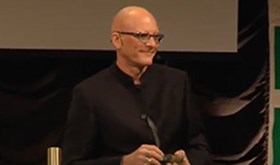This keynote explores how multinational corporations must adapt their strategies and structures to succeed in an increasingly interconnected and competitive world. It highlights leadership approaches that break away from convention and embrace agility, creativity, and global collaboration. By challenging traditional models, the session provides audiences with a sharper lens to rethink how international firms operate. Attendees leave with actionable insights to future-proof their organizations in the ultramodern business landscape.
Creating and Defending Competitive Advantages
In this session, Nordström addresses the fundamentals of building advantages that last in a world where markets shift rapidly. He shows how organizations can carve out differentiation while constantly reinventing themselves to stay ahead. Through vivid examples, he illustrates how today’s edge becomes tomorrow’s commodity unless leaders innovate relentlessly. The talk equips decision-makers with the mindset and strategies to sustain long-term market relevance.
The Role of the Leader When We Are Free to Know, Go, Do, and Be
This keynote examines the leader’s evolving role in a borderless, digital, and knowledge-driven society. Nordström demonstrates how leadership must now balance freedom with responsibility, guiding teams to harness autonomy while driving performance. He highlights the new skillsets leaders need to inspire trust, creativity, and collaboration in such an environment. Audiences gain clarity on how to redefine leadership for the age of individual empowerment.
How to Earn $$: The Principles for Earning Money in a Well Functioning Market Economy
In this talk, Nordström breaks down the fundamentals of wealth creation in modern economies. He distills complex economic theories into practical principles that organizations can apply to grow and thrive. By connecting talent, innovation, and strategy, he shows how firms can generate real and sustainable value. Participants leave with a sharper perspective on how markets function and how money is made in practice.
Articulate and Tacit Knowledge: The Foundation for the Fourth Generation of Competitive Advantages
This keynote dives into the critical role of both explicit and tacit knowledge in shaping the future of competition. Nordström explains how leveraging these knowledge forms can build the next wave of durable advantages. He draws on examples of organizations that have successfully integrated human intuition with structured processes to stay ahead. The session offers leaders a fresh framework for competing in the knowledge economy.
Multinational Corporations, Recipes and Global Tribes
In this session, Nordström explores how corporations function as cultural “tribes” operating within global markets. He explains the importance of organizational recipes — the unique mix of norms, values, and practices — that drive competitive strength. The keynote sheds light on how companies can leverage diversity and cultural intelligence to succeed internationally. Audiences gain a deeper appreciation of how business, culture, and identity intersect in global operations.
Talent Makes Capital Dance: How to Thrive in the New World
This iconic keynote emphasizes why talent, not capital, is the true engine of growth in today’s economy. Nordström argues that the organizations which best attract, retain, and inspire talent will outperform their competitors. He illustrates how human creativity and knowledge unlock capital’s full potential. The session delivers a powerful call to reimagine business around people, not just resources.
The Global Village: An Overview of Life Styles and Their Business Implications
This talk offers a fascinating look into the diverse lifestyles shaping today’s interconnected world. Nordström shows how shifting cultural norms and values across the globe create both risks and opportunities for businesses. He highlights how companies can align strategies with emerging consumer behaviors and preferences. Attendees leave with a global perspective on how lifestyle trends translate into business imperatives.





























